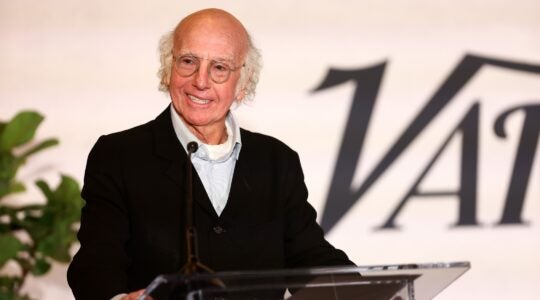Peter Beinart — the former editor of The New Republic, a onetime backer of the Iraq War and Joe Lieberman’s 2004 presidential candidacy — has the blogosphere and Jewish communal figures spinning with his new essay on American Jews, Israel and pro-Israel Jewish groups. It’s worth reading the entire piece, but here’s the main graff (thanks to Jeffrey Goldberg for flagging it) :
Among American Jews today, there are a great many Zionists, especially in the Orthodox world, people deeply devoted to the State of Israel. And there are a great many liberals, especially in the secular Jewish world, people deeply devoted to human rights for all people, Palestinians included. But the two groups are increasingly distinct. Particularly in the younger generations, fewer and fewer American Jewish liberals are Zionists; fewer and fewer American Jewish Zionists are liberal. One reason is that the leading institutions of American Jewry have refused to foster — indeed, have actively opposed — a Zionism that challenges Israel’s behavior in the West Bank and Gaza Strip and toward its own Arab citizens. For several decades, the Jewish establishment has asked American Jews to check their liberalism at Zionism’s door, and now, to their horror, they are finding that many young Jews have checked their Zionism instead.
Here’s a sampling of some of the responses:
- David Rothkopf: The Israelis are in denial and the clock is ticking. Rather than addressing the question of how to return to strategic centrality for the U.S. or how to reclaim the moral high ground in the conflict and thus win back international support, they play the settlements game, a needless and for all the above reasons, dangerous distraction from the real business at hand. My own view is that they ought to lean into the peace process and do whatever else they must to reclaim the moral high ground and the narrative they need to underpin the strong U.S.-Israel relationship that is critical to their future. If they fear that this might me concessions that are too great to the Palestinians, I say, it is worth the risk because the alternative is eroding support at critical places in the international foundations of their security.
- Shmuel Rosner: Beinart is probably on to something, and the possibility of a growing distance between American Jews and Israel is very much present in the ongoing discussion between scholars, pundits, Jewish professionals and Israeli leaders. But this story of alienation and its reasons are so much more complicated and so much more nuanced than what Beinart would have us all thinking. Indeed, it is a story worthy of telling, with careful attention to detail, with open mind. A story more interesting than the personal misgivings one Jewish liberal is trying to impose on the community as a whole.
- Leon Wieseltier: Beinart’s pseudo-courageous article is an anthology of xenophobic quotations by Israeli hawks and anguished quotations by Israeli doves: familiar stuff. I stand with the anguish, and have said so many times in these pages. But liberal Zionism must be as much Zionism as liberalism, and I do not see that the depredations of the settlers and their political sponsors relieve one of the obligation to include Palestinian behavior prominently among the causes of the conflict (in Beinart’s piece Palestinians appear tenderly as “decent people betrayed by bad leaders”), or to assert the moral imperative of Israeli security among its other moral challenges. The lovelier Israel is also threatened by bombs and missiles. Does Beinart believe that the liberal discussion of Palestine suffers from too much solicitude for Israel’s security? Does he really think that the paltry affiliations of young Jews in America are adequately explained by the alienating effects of Avigdor Lieberman and Effi Eitam? He has produced yet another theory of AIPAC as SMERSH, except that this time the omnipotent villains are destroying not American foreign policy but American Zionism.
- Alon Pinkas: American Jews will not "abandon" Israel per se, but their perceptions of Israel, the majority of which were forged after the watershed year of 1967, may very well impel them to a redefinition of relations.
- Steve M. Cohen: Indeed, American Jews’ disillusionment with Israel is more far-reaching than Beinart portrays; the causes for distancing extend beyond dissonance with liberal values; and distancing operates differently for the Jewish public and the most engaged in Jewish life. … If Israel is to retain the engagement of the coming (and present) generation of American Jews, organized American Jewry will need to provide a third alternative — one that combines love of Israel with a rich and open discourse on its policies and politics.
- Steven Rosen: Mainstream pro-Israel organizations are in fact booming, thank you. AIPAC’s income from donations is now five times what it was in 2000, and sixty times what it was when I joined the organization in 1982. It is growing commensurately in membership (including young people) and influence too. The Anti-Defamation League and the American Jewish Community are also roaring tigers. … My own impression is that the post-Iraq disaffection of some young Jews today is in fact less, rather than more, pronounced than the Vietnam distress that afflicted many when I first got involved. There’s nothing new about a minority of Jews disliking Israel — except all the attention they are getting.
- Alana Newhouse: Are American Jews abandoning Israel? If by "abandoning," one means "worrying, talking, reading, watching, arguing ceaselessly and from every angle about; visiting, pointedly not visiting; giving money to, specifically not giving money to; embracing; rejecting; holding at a distance and then rejecting; holding at a distance and then embracing," then yes, I suppose this is what American Jews are doing.
- J.J. Goldberg: Peter Beinart raises a critically important issue that’s gotten far too little attention up to now: the growing alienation between the leadership of the Jewish institutional world and the ordinary Jews whom they putatively represent. If anything, he understates the severity of the crisis. The reflexive defense of every Israeli action, which is the dominant posture of the Jewish institutional leadership since 1967, has been accompanied by an anger at any and all criticism of Israel.
- David Frum: Yet Peter is likely correct that he describes the way some — I trust not too many! — American liberals and Jewish American liberals think about Israel. These liberals cannot understand why Israel would build a border fence, or invade Lebanon and Gaza, or lose interest in a peace deal with the Palestinians. They don’t know enough or care enough about Israel’s security predicaments to investigate the reasons for these Israeli actions. They are satisfied with the explanation that Israelis used to be nice people, but have now become not nice people.
- Jeremy Ben-Ami: Peter’s noble voice and scathing analysis only add to the blaring alarm sounding at full volume across the worldwide Jewish community, warning that hope is running out for saving the democratic and Jewish character of the state of Israel before we’ve reached the point of no return.
- Jeffrey Solomon: Beinart’s brilliant analysis highlights the multiplicity of regrettable factors both in Israel and in the United States. However, his title, The Failure of the American Jewish Establishment, suggests that one must look deeper into that failure. It is a systemic failure, going well beyond those named organizations. Every synagogue, Hebrew school, Jewish Community Center, and Jewish federation shares in the failure of understanding how the power of freedom, self confidence, and education would put brain ahead of heart in the American Jewish relationship with Israel.
- Bernard Avishai: Yet Beinart’s argument seems flawed to me in its basic framing, and I raise the issue, not to pick nits, but because he inadvertently perpetuates a kind of comfortable American Jewish presumption about how organized American Jews naturally claim privileged participation in Israel’s future not only as globalist democrats but as Jews. It offends–dare I say?–the cultural Zionist in me, implicitly promising a kind of Jewish organizational life in America it could never deliver on. If we buy into Beinart’s argument, that is, we’ll not understand, first, why liberal American Jews would naturally have drifted away even from an Israel that Pete Seeger could still rhapsodize about; and, second, why the American Jews who feel most passionate about Israel are not only bound to be orthodox, but why they both connect to, and threaten, what’s most precious about Israel in ways American liberals cannot.
- Jeffrey Goldberg: I’ve only read through Beinart’s essay quickly (though not so quickly that I haven’t already exchanged a couple of e-mails with him about it) and I think it is in many ways analytically valid, if unsympathetic to some of the existential challenges faced by Israelis. But the essay’s placement, in the New York Review of Books, the one-stop shopping source for bien-pensant anti-Israelism, is semi-tragic. If Beinart’s goal is to talk to the great mass of American Jews who support the institutions of American Jewry but who are troubled by certain trends in Israeli politics, this is not the way to do it. Who is he trying to convince? Timothy Garton Ash? Peter should have published this essay on Tablet, or some other sort of publication not associated with Tony Judt’s disproportionate hatred of Jewish nationalism.
JTA has documented Jewish history in real-time for over a century. Keep our journalism strong by joining us in supporting independent, award-winning reporting.





